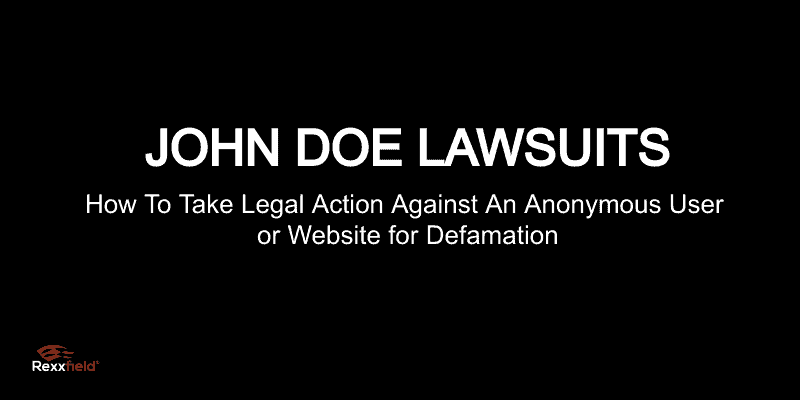How To Take Legal Action Against An Anonymous User or Website for Defamation
John Doe Lawsuits Explained.
A person is defaming, harassing, or extorting you online, or possibly infringing your copyrighted web content online. But, you do not know exactly who! How do you take legal action against someone if you don’t even know who they are? Is it worth it? Can you identify the identity of the anonymous poster?
Help me identify an IP address
Can you sue an anonymous blogger, website owner, or online user?
Yes, you absolutely can. Depending on the scenarios of your situation, you might have the option to file a John Doe defamation lawsuit.
What is a John Doe Lawsuit?
A “John Doe” Lawsuit or an unknown defendant lawsuit is used when you take legal action against an unidentified party. These kinds of lawsuits commonly occur when a plaintiff is legally “wronged” in one way or the various other by an anonymous website, blog site, or social media account. Submitting these kinds of lawsuits may additionally assist you in the process of discovering the identity of the unknown accused.
John Doe Lawsuit Example:
Someone has written a phoney or defamatory testimonial about your company on Yelp!, Google, or another platform. Now, you want to file a defamation lawsuit to get the fake or defamatory review eliminated or uncover who posted the anonymous post. Because you do not know the identity of the person who composed the post, you can file a John Doe lawsuit. John Doe lawsuits are also commonly used when an anonymous online user publishes a defamatory YouTube video clip, website, or defamatory post on your social media page.
Filing A John Doe Lawsuit
You need to submit a John Doe lawsuit as quickly as you can. Even though you do not yet know the defendant’s identity, it is best to submit your suit as swiftly as possible because the statute of limitations might run out, and essential evidence may get erased or removed from internet servers. This is an additional reason why John Doe Lawsuits are valuable. They enable you to file and preserve your evidence and claims before it’s too late.
Factors to File A John Doe Lawsuit
- An anonymous blogger is defaming you or your business.
- Phony Google or Yelp reviews
- False RipOff Report
- Online Copyright Violation
- Cyberbullying
- Retribution Pornography
- Sextortion
- Untrue #MeToo Allegation
- Personal Injury and Hit and Run
Make Sure Your Defamation Claim is Legit
Ensure you have all the required elements to file a defamation lawsuit AND see to it the Statute of Limitations for defamation claims in your state have not expired.
Work With an Internet Defamation Attorney
This procedure can be complicated, especially given that cases like these are one-of-a-kind and not every lawyer is experienced in Internet law. It is best to get in touch with an experienced Internet Defamation Attorney to ensure all your bases are covered.
Prepare a Complaint
After that, your lawyer will review your case and prepare a complaint based on the intensity of the circumstance and what kind of damages you would like to seek.
Even though you do not know the real identity of the defendant, you have to provide them with a copy of the complaint on the very same platform or site they are defaming you on. DM them on Twitter if they defamed you via Twitter. If they published an anonymous blog about you, send the complaint to their contact page, or attach it in the comments if possible. If an anonymous poster created a RipOff Record about you, you need to upload the complaint on RipOff Report.
Uncovering the Identity of the Anonymous Individual
As soon as you have made the unknown defendant aware that you are seeking their identity, you can start obtaining a subpoena to identify their identity. In Arizona, the requirements to discover an anonymous poster’s identity with a subpoena are specified in The Mobilisa v. Doe case. The process is similar for other states as well.
Hypothetical Summary Judgement
Your legal representative will make sure that you have legitimate claims. As discussed before, you must meet all the requirements for defamation, and the statute of limitations can’t be expired. This means that you need to show a court that your case can pass the summary judgment requirements without the identification of the anonymous poster.
Balancing Test
After that, your attorney will perform a stabilizing test to assess whether you can identify this user any other way and if there are any other situations that weigh towards safeguarding the writer’s anonymous rights. Essentially, making sure there are no reasons a judge should have to stop you from getting the Subpoena.
Obtain and issue a subpoena.
Submit the subpoena to the site or platform where the defamatory content is being hosted as well as the Internet Service Provider (ISP). In a lot of cases, this might include GoDaddy as lots of websites are registered with GoDaddy or with GoDaddy’s “Domains by Proxy”. Domains By Proxy is a solution that hides the name of the individual who owns the website. Since GoDaddy’s head offices lie in Arizona, your attorney must follow the needed steps described in the Mobilisa V. Doe case pointed out before.
Within the subpoena, it is essential to request every one of the required info that would assist you in obtaining the anonymous defendant’s identity. Yet you have to be careful not to request information in a subpoena that is too broad. Examples of the type of info to request when providing a subpoena to an online platform are as follows:
- Email addresses
- IP Addresses
- Web browser
- Operating System
- Times connected
- Time on Site
- Service provider
- Any details from Google Analytics, etc
If you can uncover the anonymous user’s identity, we can change the complaint and switch over the “John Doe” for the defendant’s real name!
Get in contact with a skilled Internet Attorney if you want to submit a John Doe lawsuit, or if you need to present a subpoena to GoDaddy or another domain registration company.
If you need help identifying an anonymous online user and finding an IP address, our cyber investigators can assist you in uncovering their identity and removing web content. Simply fill in our form online, and we will analyse your case and get in touch.


